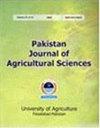植物有害物质和石膏对水稻盐胁迫的协同缓解作用
IF 0.6
4区 农林科学
Q3 AGRICULTURE, MULTIDISCIPLINARY
引用次数: 0
摘要
在许多地理区域,盐度是导致作物生产力下降和土壤质量恶化的一个环境因素。为了最大限度地减少盐度的有害影响,本研究评估了水稻连续两年(2014-2015年)在盐碱土下单独或联合施用植物激素水杨酸(SA@10-5M)和L-色氨酸(L-TRP@10-5M)以及土壤施用石膏(有或无石膏)的反应。结果表明,2014年和2015年,植物激素(水杨酸+L-色氨酸@10-5M,1:1比例)与50%的土壤石膏需求量联合处理显著影响了水稻植株的生长和产量属性,使水稻产量分别比对照提高了26%和32.80%。结果还表明,与对照相比,单独施用水杨酸或L-色氨酸改善了水稻在盐度胁迫下的行为,然而,在产量和生长属性方面,SA+L-TRP联合处理的效果最好。与不施用石膏相比,施用石膏@50%GR在改善ECe、SAR、pH、BD和HC方面获得了更高的改善效率。结果表明,在植物激素的累积作用下,水杨酸和L-色氨酸协同作用,提高了水稻的耐盐性,是缓解盐胁迫的良好策略。关键词:石膏;激素;水杨酸;L-色氨酸;大米盐度。使用的缩写词:L-TRP(L-色氨酸);水杨酸;pH(过去饱和土壤的pH);SAR(钠吸收率);ECe(土壤提取物的电导率);HC(水力传导性);BD(堆积密度);GR(石膏要求)本文章由计算机程序翻译,如有差异,请以英文原文为准。
Synergistic effect of phytoharmones and gypsum on alleviation of salt stress in rice plants
In many geographical areas, salinity is an environmental factor accounting for reduced crop productivity and deteriorates the soil quality. To minimize the injurious effect of salinity present study was conducted to evaluate the response of rice to foliar application of phytohormones salicylic acid (SA @ 10-5 M) and L-tryptophan (L-TRP @10-5 M) singly or in combination and soil-applied gypsum (with and without gypsum) under saline-sodic soil for the consecutive two years (2014-2015). Results showed that combined treatment of phytohormones (salicylic acid + L-tryptophan @ 10-5 M in 1:1 ratio) with 50% gypsum requirement of soil significantly (P ≤ 0.05) influenced growth and yield attributes of rice plants and increased the grain yield by up to 26% and 32.80% during 2014 and 2015 respectively compared with control. Results also demonstrated that individual application of salicylic acid or L-tryptophan improved the behavior of rice plants under salinity stress in comparison to control, however, best results in terms of yield and growth attributes were achieved in response to combined treatment of SA+L-TRP. Higher ameliorative efficiency in the terms of improved ECe, SAR, pHs, BD and HC were obtained with gypsum @ 50% GR in comparison to without gypsum application. Results highlighted that salinity tolerance of rice plants was enhanced under the cumulative effect of phytohormones suggesting that salicylic acid and L-tryptophan interact synergistically and proved a good strategy to alleviate salt stress. Keywords: gypsum; hormones; salicylic acid; L-tryptophan; rice; salinity. Abbreviations used: L-TRP (L-tryptophan); SA (salicylic acid); pHs (pH of soil saturated past); SAR (sodium absorption ratio); ECe (electrical conductivity of soil extract); HC (hydraulic conductivity); BD (bulk density); GR (gypsum requirement)
求助全文
通过发布文献求助,成功后即可免费获取论文全文。
去求助
来源期刊

Pakistan Journal of Agricultural Sciences
AGRICULTURE, MULTIDISCIPLINARY-
CiteScore
1.80
自引率
25.00%
发文量
18
审稿时长
6-12 weeks
期刊介绍:
Pakistan Journal of Agricultural Sciences is published in English four times a year. The journal publishes original articles on all aspects of agriculture and allied fields.
 求助内容:
求助内容: 应助结果提醒方式:
应助结果提醒方式:


